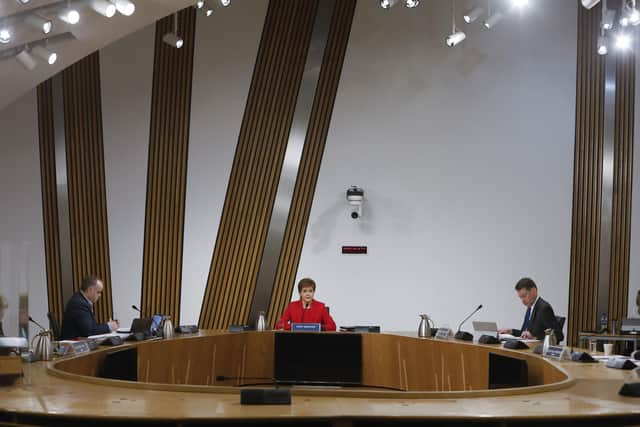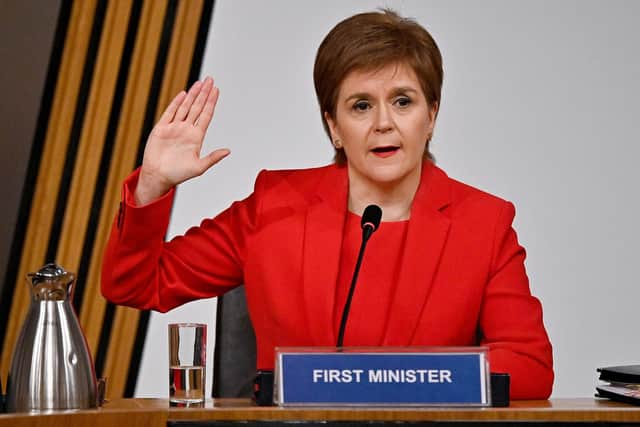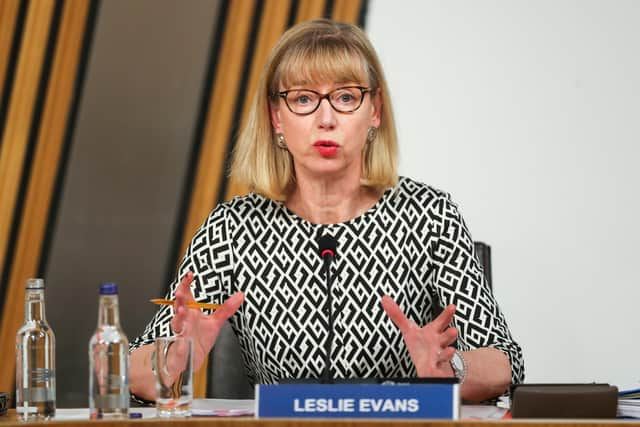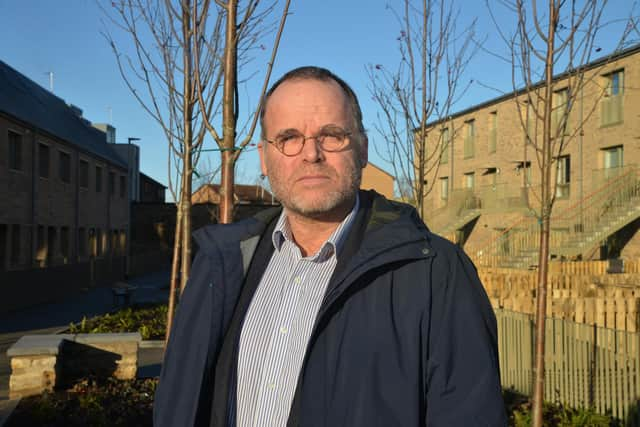Insight: Nicola Sturgeon will be tried in court of public opinion
While Salmond, whose supporters had spent a year briefing against her - stripped his performance of personal animus, Sturgeon - who has largely kept silent as allegations swirled - could not, or rather would not, keep her anger in check.
While Salmond refused to express any remorse for his past behaviour, and showed little sign of self-reflection, she apologised at the outset for the mistakes her government had made and the impact those mistakes had on the two complainers.
Advertisement
Hide AdAdvertisement
Hide AdThis was, it seemed, a conscious strategy: to cast herself as the polar opposite of her predecessor -self-deprecating where he was self-assured, relatable where he was aloof - and to to set herself up as morally superior.


She had - she told the committee - spent a lot of time thinking about how painful this saga must have been for Salmond - a man for whom she once cared; yet the previous Friday, as he gave evidence, she had searched in vain for any sign he had had considered how difficult it had been for others too.
It is a gift - this ability to mobilise her empathy and send it into battle; to juxtapose her sensitivity to others’ insensitivity so she shines in comparison. We have seen it time and time again during the pandemic - the way she prefaces Covid briefings with references to her distress over every death, and heads off criticism of misjudgements with acknowledgements of her own fallibility.
And we saw it again on Wednesday, with words like “sadness” and “regret” and “soul-searching” used to elicit sympathy and convince her audience of the human being behind the politician; which is not to suggest it is not authentic, just that she has learned how to use it to maximum effect.
And it *is* effective. Take the issue of the discrepancy over what she told Salmond about her willingness or otherwise to intervene shortly after she heard the details of the allegations at her home on April 2.


In her original testimony, she said she had left him in no doubt that she would not lobby on his behalf; but then Salmond disputed this. He said she initially offered to intervene “at an appropriate time”, but later changed her mind. His former lawyer Duncan Hamilton backed up this version.
In front of the committee, Sturgeon softened her line. She said she thought she had made it clear she was saying No, but she had wanted to let him down gently so perhaps he’d gained the wrong impression.
“My head was spinning, I was experiencing a maelstrom of emotions, I had been told something pretty shocking by Alex Salmond and there were a number of things in my head,” she said.
Advertisement
Hide AdAdvertisement
Hide AdWho amongst us could fail to identify with that? It rings true because we can put ourselves in the position of trying to say No to someone we once loved.


It was the same with her ruminations over how she felt on hearing Sky News might be running a story about an alleged incident at Edinburgh Airport. There has been much made of when the First Minister first *knew* of claims about Salmond’s behaviour, but with regard to the possible news report, she said: “The way that was raised with me just led to a sense of unease that those phone calls, whether they were from him or his lawyer, had stirred something—that they had poked a hornet’s nest. I did not have knowledge of specific complaints. It was not something that I thought about every day or that I lay awake at night at that point worrying about, but I had a lingering suspicion that there just might be something in the ether or the undergrowth.”
This seems to me a believable account of a dawning realisation. That it wasn’t a question of not knowing one day, then knowing the next, but of an accumulation of nagging doubts until - on March 29 or April 2 (depending on whose version you believe) - she was confronted with the full detail of the allegations.
Equally, some have interpreted Sturgeon’s vagueness over dates - which stood in stark contrast to Salmond’s impressive powers of recall - as evidence of obfuscation.
After her appearance, the Scottish Conservatives tweeted a mash-up of her failing to remember specific details, or replying to committee members’ questions with the words “I don’t know”, captioning it: “If you were telling the truth, would you forget 50 times?”


But, to others, Sturgeon’s admissions merely added to her air of honesty. Committee member Andy Wightman quote-tweeted the Conservatives’ mash-up, adding: “Alternatively, politicians admitting what they don't know is a good thing. If you are answering questions under oath, I would be more concerned if a witness NEVER said ‘I don’t know’.
The danger is, of course, that Sturgeon’s ability to present her fallibility in a sympathetic light might lead to errors of judgement going unaddressed.
It is all well and good to accept responsibility for botching of the new sexual harassment complaints process, and to apologise for the impact it had on the two complainers; but, as yet, there has been no resolution or reparation, nor has anyone been held accountable. The two civil servants responsible - Permanent Secretary Leslie Evans and investigating officer Judith Mackinnon - remain in post, and Evans had her contract extended by Sturgeon.
Advertisement
Hide AdAdvertisement
Hide AdThere are also unanswered questions about the Scottish government’s lack of transparency. Its delays in handing over documents to the judicial review and then the parliamentary committee - and its refusal to disclose the legal advice it received despite two Holyrood votes - are failings that have not yet been properly acknowledged.
“There are things the FM knows, things she should know, things she cannot know and things we don’t know if she knows,” Wightman’s Twitter thread continued. “Our job is to sort them all out.”
*********************************
In the hours before she was due to give evidence, Sturgeon appeared to be under mounting pressure. Though Salmond had produced no convincing evidence to back up his claims of a “concerted and malicious effort” to remove him from public life, he had raised significant issues about the handling of the original procedure and possible breaches of the ministerial code.
Then, on Tuesday, with the motion of no confidence tabled against deputy first minister John Swinney, the Scottish government finally disclosed the legal advice it was given on Salmond’s Judicial Review.
At first sight it looked damning, with significant weaknesses in the Scottish government’s case identified as early as October 31, and senior counsel Roddy Dunlop QC urging it to concede in early to mid-December.
As the pendulum swung back in Salmond’s favour, the Tories tabled a motion of no confidence in the First Minister, but were criticised for overplaying what they thought was a winning hand before the committee had heard her evidence. Facing a backlash, they were forced to press the pause button.
Although the committee went through the three stages of its inquiry - the development of the process, the judicial review and possible breaches of the ministerial code - in order, Opposition MSPs tended to home in on those issues that were most politically potent, such as claims a senior official leaked the name of a complainer to Salmond’s former chief of staff Geoff Aberdein and the question of why there had been no police investigation into the leak of allegations against Salmond to the Daily Record.
There was much focus, too, on the alleged breaches, and much discussion of the contested meetings with Aberdein in Holyrood on March 29, and with Salmond , Aberdein and Hamilton, at her home on April 2.
Advertisement
Hide AdAdvertisement
Hide AdSturgeon originally told parliament she first learned of the allegations during the April 2 meeting; but Salmond insists Aberdein told her on March 29.
Under oath, she said finding out the full detail of the two women’s claims on April 2, and realising her mentor had already admitted to inappropriate behaviour with one of them, was so shocking it obliterated her memory of the earlier meeting with Aberdein.
She also disputed the extent of the information she had recieved on March 29 or that there had been a “shared understanding” ahead of the meeting as to what was to be discussed.
Furthermore, Sturgeon said she didn’t go on to record or report the April 2 meeting, not because she considered it to be party rather than government business, but because she didn’t want to compromise the confidentiality or independence of the process.
Of course, Salmond’s theory is that Sturgeon was *obliged* to take action to prevent what turned out to be its unlawful application; and so, we were faced with the bizarre spectacle of watching the First Minister defend her decision *not* to intervene on behalf of her old ally.
More central to the inquiry, but of less interest to many committee members, was the speed with which the new harassment policy - begun in the weeks after the Harvey Weinstein scandal broke - was drawn up (Sturgeon signed it off within six weeks) and the fact it wasn’t discussed by cabinet or parliament.
Salmond believes the process was deeply flawed on the grounds of its retrospectivity and its failure to allow those facing allegations access to documents, diaries and witness statements.
Others have criticised a lack of clarity over the endgame. What reparations were to take place once the investigation had finished? The suggestion is that the final report, full of sensitive material , was to be handed to the leader of the political party the former minister had belonged to. But what - Wightman asked - if that political leader hadn’t been around at the time of the incident; or the minister was no longer a member of that party?
Advertisement
Hide AdAdvertisement
Hide AdSturgeon provided no clear answer to this. Or to whether civil servants were equipped to carry out such investigations; or to whether it was wrong for them to have passed the complaints on to the police against the women’s wishes.
Finally, there was the legal advice Swinney released, in part, the night before Sturgeon’s appearance. It showed external lawyers becoming increasingly negative about the Scottish government's chances of winning the judicial review, from October 31 when they described conceding as "the least worst option" to a point in late December when they declared the case had become “unstateable”.
Salmond’s petition had challenged the legality of various aspects of the process itself, but the point on which the Scottish government eventually conceded was its flawed application: the appointment of an investigating officer - Mackinnon - who had already had “prior contact” with the complainers. This went against the provisions of the new complaints procedure, and indeed HR policy in general.
Salmond’s argument is that continuing to defend the judicial review until January 8, 2019 pushed the cost to the taxpayer up to more than £600,000.
Questioned by the committee, Sturgeon put up a reasonable case for not conceding earlier. She said the Scottish government felt it was important to keep going because Salmond’s claims about the legality of the process ought to have been tested in court.
“We had a procedure that was being challenged not just in terms of its application to Alex Salmond, but in its fundamentals and, should we have further complaints that required that procedure to be activated, whether we were on solid ground using it,” she said. “In the wider taxpayer public interest, that is not insignificant.”
She pointed to an email from the Lord Advocate on December 11 in which he said there was no reason why the Scottish government shouldn’t keep defending its policy, and insisted it was entitled to prioritise the advice of its law officers over advice of external counsel.
Yet - with hindsight - conceding in January was the worst of all worlds. Had they done so in October - senior counsel Roddy Dunlop had explained - it would have been possible to reset the process and restart the investigation. But now Evans’ decision report and letter to Salmond were declared unlawful and “tainted by apparent bias”, and so the complainers were denied any form of resolution. It also meant Salmond’s challenges to the process itself were not tested. Three years on, the same harassment procedure is still in place, with no guarantee it is fit for purpose, although a review by Laura Dunlop QC is underway.
Advertisement
Hide AdAdvertisement
Hide AdEven more worrying was the Scottish government’s failure to comply with its “duty of candour.” In mid to late December, it became clear that, despite a Commission and Diligence process, there was information that had not been disclosed. It was this that tipped the Scottish government’s case from weak, but stateable to unstateable.
“Why was the Commission and Diligence process needed?” committee member and Labour MSP Jackie Baillie demanded. “Why did the Scottish government not hand over the information that would be required and expected of it?”
Again there was no clear answer, nor any reassurance that measures had been taken to ensure it wouldn’t happen again.
In fact, given the Scottish government’s subsequent failure to hand over documents to the committee, it’s not unreasonable to ask if they learned anything at all.
“What it should have done when it lost the judicial review in January 2019 was to ‘fess up and admit it had messed up,” Wightman says. “It should have said: ‘This is a serious mistake. We are going to publish all the material and a narrative about what went wrong and be really open, on the front foot and say: ‘If parliament wants to look at this in any more detail it is very welcome to do so.’
“Instead of which they didn’t disclose anything to help the public understand what had gone wrong. The committee then struggled and struggled to get documents, and all the rest of it - and then 6pm on the day before the First Minister appears, we eventually see the external advice. That’s a massive failing. That’s not the way governments should behave.”
*****************************************************
Unsurprisingly, Sturgeon’s “performance” met with a mixed reception. Professor James Mitchell, professor of public policy at Edinburgh University, accused her of obfuscation and deflection and of using Salmond as a shield. But former BBC Scotland political editor Brian Taylor described it as "deftly executed; thorough, respectful, controlled and capable."
At a granular level, there were discrepancies in her testimony, but pan out from the endless argy bargy over the two meetings four days apart and what are you left with? A First Minister who oversaw a new harassment procedure to encourage women to come forward and refused to succumb to pressure from her former ally to intervene on his behalf.
Advertisement
Hide AdAdvertisement
Hide AdFor her part, she seemed upbeat in the face of a grilling which, with a few notable exceptions, must have felt - as Denis Healey once put it - like being savaged by a dead sheep. That she frequently referenced James Hamilton’s inquiry - the ultimate arbiter on whether she breached the ministerial code - suggests a degree of confidence in its outcome too.
One of the things Sturgeon successfully achieved was to highlight the way the two complainers, who ought to have been at the centre of this inquiry, have become mere projections of other people’s agendas, their experiences co-opted and their views articulated in their absence. “This is not a criticism of the committee, but one of the genuine worries that I have here is the extent to which this whole process has kind of sidelined and silenced the voices of complainers,” she said.
Another of the First Minister’s refrains - with reference to her own experience - is that women continue to be held accountable for the behaviour of men. This contention is sometimes downplayed by those who suspect her of deflecting attention from her own failings.
But then Conservative MSP Murdo Fraser obliged by showcasing just how prevalent such impulses are. In a low point in the evidence session, he asked her to apologise to the people of Scotland “for asking us to trust [her predecessor] for so long”. To which she answered: “I trusted him and I am not going to apologise for the behaviour of somebody else. If I have things in my behaviour to apologise for, I will apologise. But I do not think it is reasonable to ask me to apologise for the behaviour - some of which he will deny - of Alex Salmond.”
These exchanges were useful reminders to the committee of some of the issues at the heart of the #MeToo movement and the attitudes which continue to militate against women reporting harassment by powerful men.
Though the complainers did not give evidence, it is understood the committee might consider offering them space at the front of the report in which to make their own comments.
Having faced so many delays, the members are up against it. Their work has not been helped by the Scottish government’s insistence on releasing its legal advice in batches. New information was still being released on Friday night - more than 48 hours after Sturgeon finished giving evidence.
With members divided along party lines, it seems unlikely to reach a consensus; its report will have to reflect the clash of narratives.
Advertisement
Hide AdAdvertisement
Hide AdConsensus beyond the Parliament walls is equally unlikely. With an election looming, the First Minister will soon be tried in the court of public opinion. And so the propaganda war rages on. On Friday afternoon, she tweeted a photograph of a Zoom call with climate envoy John Kerry ahead of COP26, with bouquets of flowers from well-wishers prominently displayed. Meanwhile, in Glasgow, a plane trailed the legend “Resign Sturgeon” across a bright blue sky.